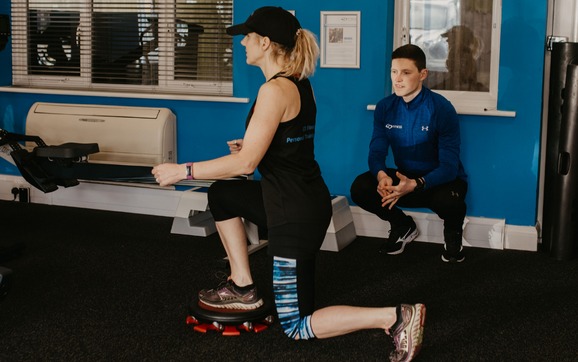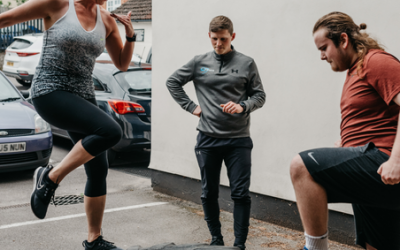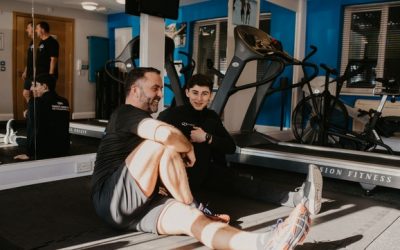Some days there aren’t enough hours. Others, you don’t feel like getting anything done at all. It’s a state of affairs that has been exacerbated by the shapeless years of the pandemic, but with things getting back to normal, it might be time to rethink how you approach your time.
Designed to make you more focused, rested, supple and – crucially – happier, this guide takes you from waking up to bedding down at night.
Give it a go, it might not make you a more efficient and productive person, but it will definitely help you reclaim some time for you. Because that’s the most important thing, after all.
1. Stretch when you wake up – kick the covers off and start with a supine stretch.
Lie on your back with your knees bent. Keep your back flat as you twist your hips to one side then the other, keeping your knees together as if you have an elastic band around them.
Aim for 20 slow rotations each side. If doing it in bed doesn’t work for you, the floor is even better. This will help undo any kinks in your back and elongate the spine helping you stand tall and breathe deeply as your day begins.
2. Visualise success before you leave – so often we rush out of the house, with our heads full of everything we have to do that day. This isn’t great for our anxiety or stress levels as it puts us in a state of pre-emptive alert before we’ve even got to the office. You can try and break this cycle by taking five minutes to focus on three specific goals you want to achieve that day. Think about what you would feel happy and fulfilled to have achieved by the end of the day.
Keep a note or a journal where you write down your three most important goals. They can be work-related or personal to you. Studies show visualisation can even make us more likely to achieve our goals, in time boosting our optimism levels and mental health.
3. Learn something new on your commute – it might feel like it is, but your commute isn’t dead time, it’s a great opportunity to take time for yourself. Whether you walk, cycle, get the train or drive you can engage in a podcast as a study has shown that when you listen to a podcast your own communication abilities are improved. Narrative podcasts also engage different parts of your brain and sounds of laughter encourages the release of our happy hormones 🙂
4. Get away from your desk at lunch time – it is no surprise that there have been countless studies that have linked sitting all day to back pain.The key is to get on your feet, either for a lunchtime wander or if you’re in need of a simple but useful stretch you can try the standing trunk extension stretch.
Start with your feet shoulder-width apart with your hands placed across your lower back for additional support. Increase the arch or your back by slowly leaning backwards until you feel your abdomen gently stretch and feel slight pressure on your lower back. Hold for ten seconds then repeat the process two to four times.
5. Recharge through the 3pm slump – that feeling of fatigue at 3pm is normal, and a result of your blood sugar levels dipping. Rather than reaching for a sugary snack, you can boost your alertness by doing something as simple as adjusting your computer monitor. Or if you have the ability to do so, convert your desk to standing!
There are multiple studies that say that how upright or reclining your body position is when seated, this will impact your level of alertness, with sitting upright increasing your focus and slumping decreasing it. Good ergonomics will have a knock-on effect on postural health and inspire more of an upright or what is known as the ‘power posture’ which inadvertently will impact focus, concentration, and energy levels. Making sure your monitor is at eye level, then, is key.
6. Time exercise according to your goals – some people prefer working out in the morning, others in the evening. And while actually working out is more important than the time of day, a study published in 2022 in the journal Frontiers in Physiology does have some insights.
It found that early morning exercise was most beneficial for women when it came to reducing abdominal fat and blood pressure, while evening exercise was more advantageous for women when it came to improving mood, food intake and upper-body strength.
The men who were monitored were able to improve their upper-body strength as effectively whichever time, but showed greater results for improved heart and metabolic health, as well as improved emotional wellbeing when working out in the evening.
7. Screens away before bed – we know now that the blue light emitted from our screens is enough to disturb the body’s natural circadian rhythm. This could make it harder to fall asleep or lead to you feeling less alert the next day. Make sure you wind down at least an hour before bed then – no falling asleep to Netflix – and switch off all electronic devices. A book is the perfect alternative, but be careful what you pick.
Bedtime is not really the time for non-fiction or self-improvement books. We need to give our brains a chance to switch off and relax. Fiction can be beneficial because it takes us into a different world, one which needs our imagination and creativity to see. This helps stop the rumination around our worries which can prevent sleep and build anxiety.




